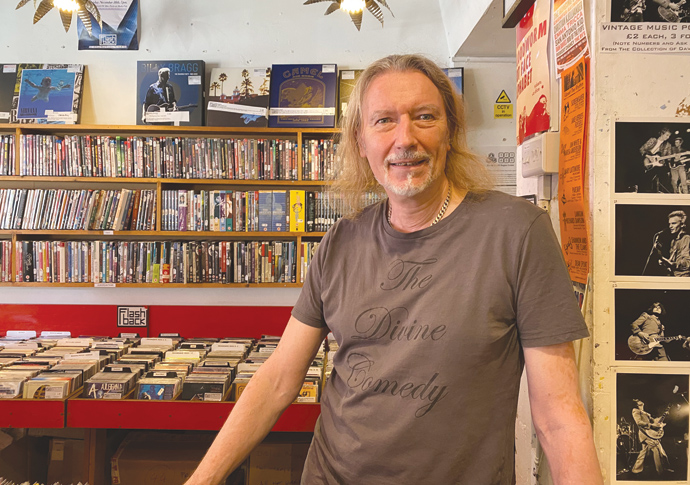On the record, why vinyl will play on and on!
Documentary interviews DJs, musicians, and LP addicts about the enduring musical format
Friday, 20th September 2024 — By Daisy Clague

Mark Burgess at Flashback Records in Essex Road
WHY does vinyl refuse to die?
This is the subject of a new documentary which interviews DJs, musicians, and LP addicts about the enduring musical format – and includes the owner of Islington’s longest-standing record shop.
Mark Burgess established Flashback Records in Essex Road at what he described as the “nadir” of vinyl.
“Foolishly, I started selling vinyl in 1997, when the death of vinyl had really started to kick in, and managed to sort of – just about – make it work,” he said.
Mr Burgess explained that major record labels gradually stopped producing vinyl in the mid-1990s in an effort to reduce the number of formats they had to put out, especially as sales of CDs and cassettes – cheaper for the labels to produce – went up.
He added: “2006 was probably the real low point and then, remarkably, there has been this resurgence, and vinyl sales have pretty much doubled every year since then.”
Mr Burgess puts vinyl’s stamina down to three factors.
“Some people believe that the sound quality is better,” he said. “Secondly, there’s the ritual aspect of it. Putting on a piece of vinyl feels like an event, as opposed to just putting your Spotify on shuffle.”
Lastly, Mr Burgess said that an album’s narrative can be built around the format of vinyl itself, such as which songs go at the end of each side.
He added: “Albums like Dark Side of the Moon and Ziggy Stardust have a strong narrative all the way through – they’re designed for vinyl.
“While the individual pieces of music are excellent, it’s like taking one petal of Van Gogh’s Sunflowers and thinking – ‘that’s a great petal’.”
The argument is that by skipping the experience of listening to a record all the way through, listeners risk missing out on the bigger picture.
So how did Flashback Records survive to see vinyl get popular among collectors again?
“In the early 2000s, two thirds of record shops in the UK closed down,” Mr Burgess said. “We survived through brute ignorance and refusing to give up, and hopefully having a good attitude.
“We just try and be nice to people, we don’t have that cooler-than-thou attitude.”
He added: “We won’t give people a hard time for liking Lionel Richie.”
In more than 25 years – first on the Essex Road, and now with two sister shops in Shoreditch and Crouch End – Flashback has shifted signed Sex Pistols albums, the first ever Joy Division EP, and a super rare early version of the Beatles’ first album, Please Please Me, which was sold for several thousand pounds.
But perhaps the rarest record to pass through Mr Burgess’s shop was a one-off pressing of a 1978 punk single by the band Bona-Rays, fronted by fellow Islington resident Chas Hines.
Ms Hines came to Flashback to sell her record collection a few years ago, and when Mr Burgess was leafing through the contents later on he came across the unusual-looking disc.
Ms Hines returned to the shop just as Mr Burgess was playing her two-minute track, and now they have reformed Bona-Rays, with Ms Hines singing and Mr Burgess on the bass.
“To me, that one was a bit like gold dust,” Mr Burgess said, adding: “I can’t see anything having the same allure as vinyl.”
The documentary in which he appears is called Vi4YL and will be showing at cinemas in Kilburn, Shoreditch and Crouch End before the end of the year.